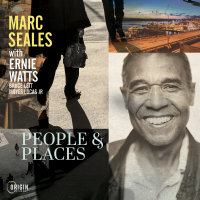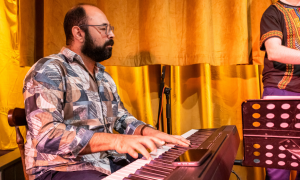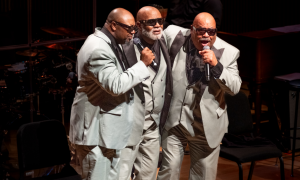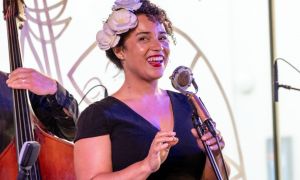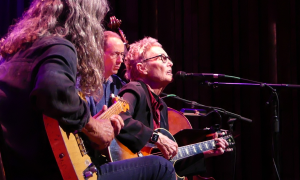Home » Jazz Articles » Live Review » 12 Points Festival 2019
12 Points Festival 2019
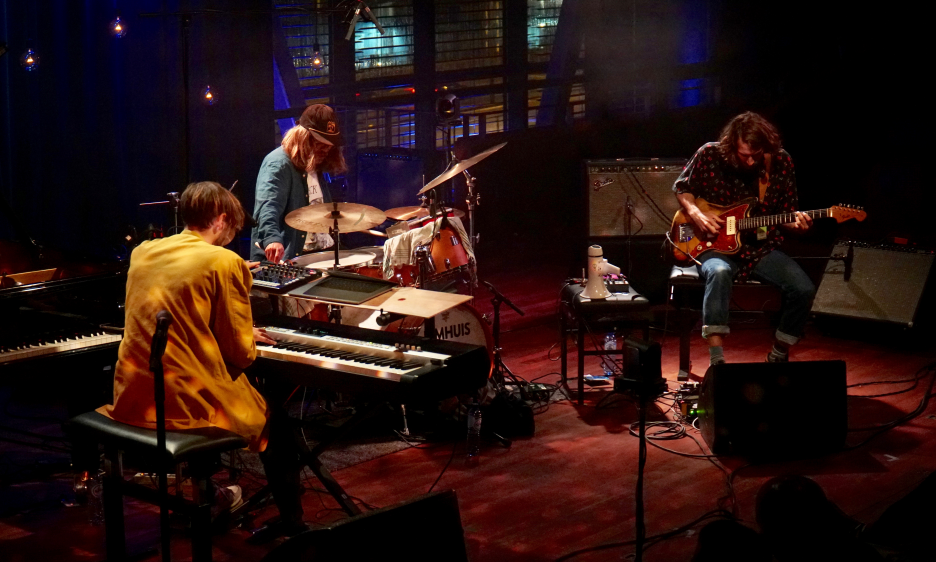
12 Points Festival
Amsterdam, Netherlands
September 25-28, 2019
Jazz, as a diverse and heterogeneous field by nature, is represented at each 12 Points edition by young musicians and groups (age 35) with a strong artistic profile and solid and attractive performance capabilities. The festival represents in a nutshell what the next generation is willing and able to contribute. The emphasis is not so much on assumed audience compatibility/acceptability but rather on originality, artistic challenge, strong identity and quality of audience connectivity.
Selection and indication
The program selection of 12 Points Festival organized by Irish Improvised Music Company aims at giving an indication about what's next, what might be strong groups in the near future based on a clear concept of artistic identity/ development, an observation of young musicians/groups from all over Europe, a vast network of informants and an application process. 12 Points, which is a residential festival, a kind of camp for young up-and-coming musicians/groups from 12 European countries, is considered to be an important junction on the way to enter prestigious European festivals and clubs (for earlier editions see my review here (2014) and here (2017).The aim of 12Points is that presenters read this, check the groups and musicians, listen to and watch their music, keep in mind their names and seriously consider building programs with some of those included (for good reasons). This year's 12 participants came from Austria, Belgium, Finland, France, Italy, Netherlands, Norway, Spain, Switzerland, Poland, United Kingdom (2). For the first time the guesting country/venue added a line of five domestic showcases, the Orange Line. Striking here was the extremely high proportion of musicians of non-Dutch origin, some groups even comprising no musicians of Dutch origin at all. This can only partly be ascribed to the open international tradition of the Dutch scene.
The selection/choice is not meant as representative but as indicative, as mentioned. Looking at the choice of the last nine editions, this is what it shows in terms of countries musicians/groups were coming from: (1) Represented in all 9 editions since 2011: France, Norway, UK, Ireland
- Represented in almost all editions since 2011: Austria, Belgium, Netherlands, Switzerland, Denmark, Sweden
- Represented in 4 or 5 of the 9 editions: Germany, Finland, Italy, Portugal
- Represented in less than 4 editions and more than 1: Poland, Slovenia, Spain
- Represented in one edition: Bosnia, Greece, Hungary, Lithuania, Estonia
Trend
Two striking things were discernible during the four days of this year's 12Points: first, this young generation plays more for its own generation's ears, modes and moods. Second, this young generation works easily 'cross-sectional,' which means the musicians adapt a diversity of approaches, techniques and influences to feed those into their own new shapeshifting forms or in hybrid framings of ambient, classical, pop, rock, techno, hip-hop and actionist agit-prop.Highlights
For me the four days/nights of 12Points, including the Dutch Orange Line, had four highlights: Trio Heinz Herbert from Switzerland, No Tongues from France,
Filippo Vignato
trombone
Sanem Kalfa
vocals
Joris Roelofs
woodwinds
Han Bennink
drumsb.1942
Trio Heinz Herbert
The music of Trio Heinz Herbert, a close creative communion of " data-original-title="" title="">Dominic Landolt (Guitar, Effects), " data-original-title="" title="">Ramon Landolt (Keys, Synth, Samples) and " data-original-title="" title="">Mario H?nni (Drums) sounded like a fanciful Kinderzimmertraum, a happy children room dream, having expanded deep into adulthood. A multitude of musical phenomena has entered its door and become entangled in all kinds of playful exploration to build wonderous phantasy worlds of its own—a puzzle with manifold fits and its own magics. And, when unleashed, it seduced its listeners first by seemingly purposeless Spielereien, by dreamlike juggling of playful particles, from which deep shapes emerge thereby leading its virginal listeners into their own dreamlands. At its borders a turbulent enthralling groove arose, pulling its threshold-crossing listeners into an escalating, stirring up, flickering stream interspersed by revving up guitar screams, mumbling shadows and shouting ghosts.This trio's performance was the most fascinating and enthralling part of this year's edition of 12Points Festival, that happened at Amsterdam Bimhuis. It was a trip with a high degree of momentum and substance as well as a coherent piece of music. And, what was even more striking, it was something uniting listeners of differing perceptions and views on music. People of different background, age, experience and taste evidently all got enchanted. It confirmed what McArthur fellow ('genius grant')

Mary Halvorson
guitar"I saw Trio Heinz Herbert perform live at the Unerhort Festival in Zurich, and it was one of the best concerts I saw all year. Intense, mesmerizing, captivating... the entire audience was entranced. The trio is so synched in; it really sounds like a singular mind, and their communication and ideas are spectacular."
What, then, were its distinctive qualities? The music was charmingly emerging from a sea of playful particles. Opening up into a wider sonic landscape it was arising, unrolling and miraculously shapeshifting in a colorful sonic space as well as exploding into a gorgeous groove and finally vanishing into the soughing, rustling depths of space. These are unifying processual aspects of making use of heterogeneous, deeply absorbed musical influences in a flow of momentary alertness and developing freedom that increasingly enables the music 'to fill itself in' as a self-actualizing force via the musicians as medium.
No Tongues
No Tongues was the second unusual group, not only concerning its line-up with two basses (" data-original-title="" title="">Ronan Prual, " data-original-title="" title="">Ronan Courty), trumpet (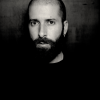
Alan Regardin
trumpetThey transposed those into mighty, raw, rhythmically sharp-edged instrumental sounds. The two basses were partly used like a Hungarian ©╣t?gardon, a three-or four-string folk instrument looking like a cello but played percussively like a drum with a stick in order to produce sounds as intense and visceral as in the field recordings. The bassists—and the horn players too -had to apply intensively extended techniques and preparations here. In this recontextualization those were mirrored by the ancient vocal expressions and suddenly acquired quite a different and remarkable significance. Or, as the group expresses it itself: the group "makes a dance with the past to illuminate the present." Through these recontextualization music normally labelled as abstract 'free jazz' gets a natural, close to life significance.
Kalfa/Dumitriu
Kalfa/Dumitriu is a durable duo of Turkish vocalist Sanem Kalfa and Romanian violist/guitarist George Dumitriu based in Amsterdam. Both were part of
Kaja Draksler
pianob.1987
Filippo Vignato
Trombones are not abundant presently in jazz (check, for instance, trombones among the countless ECM albums). Consequently, trombonists are specially exposed. It is easy to name a series of strong trombone voices. Filippo Vignato is an up-and-coming trombone voice that matters, to keep an ear on. He is an agile, in-demand ensemble player as well as a defining leader amongst others in a quartet with pianist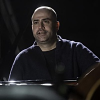
Giovanni Guidi
pianoMattia Magatelli
bass, acoustic
Attila Gyarfas
drumsb.1990

Nils Wogram
trombone
Samuel Blaser
tromboneb.1981

Gianluca Petrella
tromboneb.1975

Wolter Wierbos
tromboneb.1957
Yves Robert
tromboneb.1958

Ray Anderson
tromboneb.1952

Albert Mangelsdorff
trombone1928 - 2005

Hank Roberts
cellob.1954
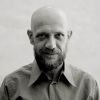
Giorgio Pacorig
pianoYannick Lestra
keyboardsDifferent perspectives, re-framing
Times ago "young generation" was an easily definable, clear entity. Presently, so many young generation musicians continuously enter the scene (and the market) every year that it is less sharply defined and less clearly visible. Also, the distance from the roots/origins, to the historic social and political context of jazz, has increased considerably. The jazz field has become more diffuse(ed) and the kind of artistic urge driving younger generations is clearly different now.Presently, a young person is confronted with an abundance of choice concerning listening to, and engaging in, as a musician. There is the choice to acquire needed musical skills in a school-/academic context to play what their predecessors have created themselves in the wild on a scene's stages. That definitely constitutes a different experiential reality entailing also a different perception and likewise orientation. You have to bear that in mind when talking about and judging young musician's achievements.
Older generations tend to expect new generations to progress in the same furrow, in the line of progressive development they themselves have experienced through their life. But that's not a simple classificatory match. "New music" is primarily the result of listening to existing music with 'young,' 'fresh,' 'biased,' 'open,' 'engaged' etc. ears and the confluence of traces of focused listening and unconscious intake in one's own actual execution of music.
As already mentioned, the youngest generations have a different experiential point of departure and orientation. While jazz for older generations has long been a provocative pioneering activity within societal practice to foster emancipatory change and empowerment, the younger generation start from a well-prepared state with other possibilities of making choices and different demands, of finding their own way, finding their own voice, building a unique artistic identity. For them it is a new beginning, a new way of defining jazz through their way of performing. The question, then, is in which creative ways younger generations actually feed into the commonly defined line of progress, into the furrow drawn by previous generations. From older generations' point of view music of the youngest generation is regularly indicated/judged as 'not original,' 'epigonal,' 'without artistic urgency,' as a not thrilling recurrence of already known things. Such perceptions are understandable but also half-baked.
Evidently there are young musicians/groups that operate in historical modes adding little or nothing, playing it as repertoire music, which by the way can be legitimate but wouldn't count as core jazz activity. But what to say about a bebop-driven performance that thrills young audiences' souls? Is it a nostalgic retro thing then or a (temporary/fashionable) revival? What makes it more than a doubtful repetition? When can it be considered as pushing the envelope (not to use the devaluated term 'innovative')? Obviously, in the process of acquisition, the adaptive processes of assimilation, accommodation and deep absorption of something has to be filtered out and synthesized into very own (not too well known) shapes, twists and evocative energies.
Considering the music of the participating groups, six (temporary/provisionary) varieties can be discerned, showing an interesting distribution:
- The (post) BOP Mode (Sun-Mi Hong, Family Band, Guy Salomon) = 3
- The POP Mode (Katu Kaiku, Robocobra, The Brums, Juno, Broos/Peet, Katu Kaiku) = 6
- The CLASSICAL Mode (Kasia Pietrzko, Xavi Torres, Ikarai) = 3
- The FREE Mode (Sketchbook Quartet, Filipo Vignato 3, Joris Roelofs, Family Band, Dumitriu/Kalfa, Broos/Peet) = 6
- The MESSAGE Mode (Family Band, Robocobra) = 2
- The UNIVERSE Mode (No Tongues, Trio Heinz Herbert, Family Band, Ikarai) = 4
Back to the future: varieties, games
Observable at this moment is a revisionist turn of younger generations' jazz listeners/audiences to older jazz waves. The actuality of an old-generation- musician such as
Pharoah Sanders
saxophone, tenor1940 - 2022

Kamasi Washington
saxophoneb.1981

Michael League
bassThrough the historical circumstances of its originating jazz was a necessarily open, subversive and signifying form of expression that used other more flexible means of inclusion/exclusion, appropriation, expansion, transformation and self-assertion through practice. Through post-war Americanization it has spread world-wide to actors from other cultures and from that has stratified in manifold varieties.
There are lots of young musicians still pushing the envelope conquering new territories. Names like

Julien Desprez
guitar
Lukas König
drumsb.1988
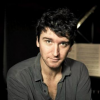
Marcin Masecki
pianoThe point about the just mentioned names is just their unorthodox use of extended techniques and advanced elements from the free improvising, noise and other paradigms. Pop-inflected groups as Broen or Juno also make use of extended techniques in a different framing. In other words, the younger generations are freer in choosing and conflating things from different paradigms to serve their own way and form of expression. Surely, there are more or less conservative, more or less wild, more or less good and more or less successful variants of a certain variety.
A brief gardening glance
To finish, here's a short glance at the various garden beds this year's 12Points+Orange Line could be watched besides the already discussed ones. It seems not accidental that Irish Robocobra Quartet (residing in Belfast) and Family Band from London with a strong Scottish blend, fall in the message mode variety. Robocobra, which is " data-original-title="" title="">Chris Ryan, Tom Tabori, Peter Howard, Nathan Roger, did it with a singing and yelling drummer, in your face hew-hew raw rock sound and stirring up lyrics. Robocobra sounds as a child of rock group Morphine infected by Sonic Youth also, not with guitars but with spun out multilayered and climaxing horn parts. Also, Finnish trio Katu Kaiku of " data-original-title="" title="">Erik Fr?ki, saxophonist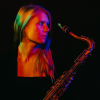
Adele Sauros
saxophone
Trygve Seim
saxophone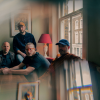
Riley Stone-Lonergan
saxophoneb.1990
Steve Hanley
drumsYoung Polish pianist Kasia Pietrzko convinced with deep architecture and mighty dynamics emerging from close interaction with her excellent trio partners bassist

Andrzej Swies
bass, acoustic
Piotr Budniak
drumsXavi Torres
piano
Sun Mi Hong
drumsGuy Salamon
drumsAlistair Payne
trumpetBrodie Jarvie
bass, acousticA rather sad case was the attempt of Dutch ensemble Ikarai to catch actions and personality of boxer legend and activist Muhammed Ali with a piano trio (" data-original-title="" title="">Camiel Jansen,

Julian Schneemann
pianob.1992
Jeroen Batterink
drumsYanna Pelser
violinIt is worthwhile to mention that boxing has been subject of a well-designed full evening Dutch music program some 20 years ago. In the 90s well-known reedist

Ab Baars
clarinetWallonian The Brums from Li©©ge (" data-original-title="" title="">Alain Deval, Adrien Lambinet, " data-original-title="" title="">Antoine Dawans, Clément Dechambre), with its three horns and drums line-up, brisent le brume, broke the mist, operating from a firm techno basis starkly resonating through, shook up and captured the 'Brumhuis' space. Self-conscious and determined Dutch duo of keyboardist Nils Broos and drummer

Jamie Peet
drums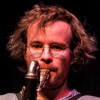
Leonhard Skorupa
saxophone, tenorb.1988
It should be clear that the music is a differentiated and, itself, differentiating spectrum, something distinguished from the hyperbole, windbaggery and mindless phrasemongers of an increasingly slack PR machinery.
Tags
Live Reviews
Henning Bolte
Netherlands
Amsterdam
Filippo Vignato
George Dumitriu
Sanem Kalfa
Joris Roelofs
Han Bennink
Dominic Landolt
Ramon Landolt
Mario H?nni
Mary Halvorson
Ronan Prual
Ronan Courty
Alan Regardin
Matthieu Prual
Kaja Draksler
Tom Z©”
Giovanni Guidi
Mattia Magatelli
Attila Gyarfas
Nils Wogram
Samuel Blaser
Gianlucca Petrella
Wolter Wierbos
Yves Robert
Ray Anderson
Albert Mangelsdorff
Hank Roberts
Giorgio Pacorig
Pasquale Mirra
Yannick Lestra
Pharoah Sanders
Kamasi Washington
Michael League
Julien Desprez
Lukas K?nig
Marcin Masecki
Jerzy Rogiewicz
Chris Ryan
Tom Tabori
Peter Howard
Nathan Roger
Erik Fr?ki
Adele Sauros
Mikael Saastamoinen
Trygve Seim
Kim Macari
Riley Stone-Lanergan
Tom Rivi©©re
Steve Hanley
Kasia Pietrzko
Andrzej Swies
Piotr Budniak
Xavi Torres
Sun-Mi Hong
Guy Salamon
Alistair Payne
Ian Cleaver
Jos©” Soare
Brodie Jarvie
Dusko Goykovitch
Camiel Jansen
Julian Schneeman
Jeroen Batterink
Tessel Hersbach
Yanna Pelser
Bence Huszar
Ab Baars
Alain Deval
Adrien Lambinet
Antoine Dawans
Cl©”ment Dechambre
Nils Broos
Jamie Peet
Leonhard Skorupa
Daniel Moser
Alexander Wallner
Konstantin Krautler
Comments
PREVIOUS / NEXT
Support All About Jazz
 All About Jazz has been a pillar of jazz since 1995, championing it as an art form and, more importantly, supporting the musicians who make it. Our enduring commitment has made "AAJ" one of the most culturally important websites of its kind, read by hundreds of thousands of fans, musicians and industry figures every month.
All About Jazz has been a pillar of jazz since 1995, championing it as an art form and, more importantly, supporting the musicians who make it. Our enduring commitment has made "AAJ" one of the most culturally important websites of its kind, read by hundreds of thousands of fans, musicians and industry figures every month.
Go Ad Free!
To maintain our platform while developing new means to foster jazz discovery and connectivity, we need your help. You can become a sustaining member for as little as $20 and in return, we'll immediately hide those pesky ads plus provide access to future articles for a full year. This winning combination vastly improves your AAJ experience and allow us to vigorously build on the pioneering work we first started in 1995. So enjoy an ad-free AAJ experience and help us remain a positive beacon for jazz by making a donation today.

Amsterdam
Concert Guide | Venue Guide | Local Businesses
| More...
Amsterdam Concerts
Sep
16
Tue
Surprise Chef
Paradiso Noord
Amsterdam, Netherlands
Sep
17
Wed

Bremer / McCoy
Tivoli/vredenburg
Utrecht, Netherlands
Sep
19
Fri
Basklarinet Festijn
De Pletterij
Haarlem, Netherlands
Sep
20
Sat
Basklarinet Festijn
Tivoli
Utrecht, Netherlands
Sep
21
Sun
Basklarinet Festijn
Bimhuis
Amsterdam, Netherlands
Sep
23
Tue
Aynur I Concertgebouw Amsterdam
Stichting Jazz Orchestra Of The Concertgebouw
Amsterdam, Netherlands
Sep
26
Fri
Alessandro Fongaro's Pietre
De Doelen
Rotterdam, Netherlands
Sep
28
Sun
Frank Gambale (All Star Group)
Q-factory
Amsterdam, Netherlands
Oct
1
Wed

Diana Krall
Koninklijk Theater Carré
Amsterdam, Netherlands
Oct
4
Sat

Dhafer Youssef
De Doelen
Rotterdam, Netherlands

Amsterdam
Concert Guide | Venue Guide | Local Businesses | More...
Sep
16
Tue
Surprise Chef
Paradiso NoordAmsterdam, Netherlands
Sep
17
Wed

Bremer / McCoy
Tivoli/vredenburgUtrecht, Netherlands
Sep
19
Fri
Basklarinet Festijn
De PletterijHaarlem, Netherlands
Sep
20
Sat
Basklarinet Festijn
TivoliUtrecht, Netherlands
Sep
21
Sun
Basklarinet Festijn
BimhuisAmsterdam, Netherlands
Sep
23
Tue
Aynur I Concertgebouw Amsterdam
Stichting Jazz Orchestra Of The ConcertgebouwAmsterdam, Netherlands
Sep
26
Fri
Alessandro Fongaro's Pietre
De DoelenRotterdam, Netherlands
Sep
28
Sun
Frank Gambale (All Star Group)
Q-factoryAmsterdam, Netherlands
Oct
1
Wed

Diana Krall
Koninklijk Theater CarréAmsterdam, Netherlands
Oct
4
Sat

Dhafer Youssef
De DoelenRotterdam, Netherlands



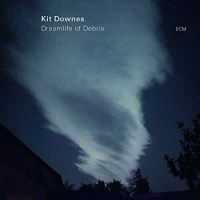

 Buy Now
Buy Now





